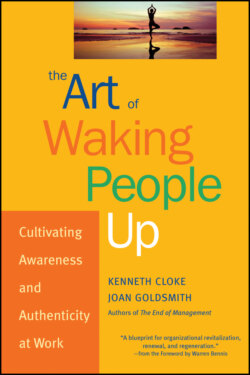Читать книгу The Art of Waking People Up - Kenneth Cloke - Страница 30
The Limitations of Roles and Expectations
ОглавлениеWhen we become frightened of these aspects of change, we defend ourselves against learning, resist receiving honest feedback, hide behind roles, become inauthentic, cease being fully awake, and grow insensitive to what is happening around and inside us. We fight to preserve what is familiar, thinking we are protecting our power or image. Yet in doing so, we diminish our capacity for honesty and empathy with ourselves and others. Eventually we become stuck and unable to grow. Whatever our role, at a subtle level, power, ego, and resistance to change are increased by identifying personally with it, while honesty, authenticity, and openness to change are diminished.
In truth, these self-defining roles do not exist—nor, at a human level, do organizations, job titles, hierarchies, or status. They are figments of our imaginations—constructs, hypnotic images, mirages, phantoms, fetishes, and hallucinations that distance us from what is real and from each other. Every role is inauthentic, simply because it captures only a part of what we do and largely ignores who we are. Yet we invest these images with the power to control our lives, twisting them gradually into conformity with other people’s expectations and losing our capacity for self-definition.
In Fraud, a novel by Anita Brookner, a woman tells a friend, “Fraud was what was perpetrated on me by the expectations of others. They fashioned me in their own image, according to their needs.” People become inauthentic and fraudulent by hiding the most interesting, human parts of themselves behind masks and roles, revealing only what they hope others will find acceptable. This is a kind of sleep from which anyone can awaken at any time, even after years of accommodation. To do so requires cultivating awareness, authenticity, congruence, and commitment in ourselves, in others, and in organizations.
However we describe ourselves, whatever roles we assume, they do not touch the deepest parts of ourselves. In addition, in all our descriptions, there is an “I” that is describing “Myself.” Yet the one describing is not the same as the one described. If “I” am able to observe and describe “Myself” as though from outside, which one am “I”? Every role or description we use to describe ourselves seems solid, yet beneath it lies a thought, and beneath the thought lies a thinker. Waking up means discovering the thinker. As we do so, we accept responsibility for our choices and recognize that our power lies there, rather than in our roles and self-definitions.
